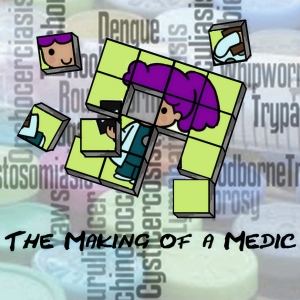We have all asked that question to someone at some point. If you are currently in medical school, chances are you aced your way through high school. But that was high school, where you could have solved a bunch of exam papers from the previous years and skimmed through chapter summaries weeks before GCE Advanced level exams and still pulled out an A. Sadly, those days are over and you have been thrown into a rather massive pool of information that you are expected to retain. So, how do you go about it?
Oppa Gunner Style!
Gunner (n.) A gunner, especially in medical schools and law schools, is a person who is competitive, overly ambitious and substantially exceeds minimum requirements. A gunner will compromise his or her peer relationships in order to obtain recognition and praise from his or her instructors and superiors. For a better idea, refer to this.
Unfortunately for me, one of the first few friends I made during first year was the gunner. Let me tell you about the first semester of the first year of medical school. It is practically the only time that you get to relax a little. But not when you’re friends with the gunner! Because she is going to have serious dark circles from day one and tell you about how she failed to get through all the material even though she was up until 2:30 a.m. So there I was, my first year, fresh as a fetus with no clue about what to do, trying to stay up till 2:30 a.m., mindlessly reading through mountains of stuff.
One week in, I was super tired, barely alive and dozing off during lectures. And I am a person who really needs to listen to lectures because self-studying is just not my thing. So I was stuck in a situation where I was trying to study while very sleep deprived. As a result, I was barely retaining any information, and to top it off, I was unable to concentrate on lectures.
Creatively Procrastinating
After the gunner method failed miserably (I mean, who are we kidding, I ain’t no gunner), I decided to try a different approach: online resources. I started reading blog after blog talking about effective study methods. I downloaded YouTube videos, pictures with mnemonics, easy-to-remember anatomy pictures, all of it! But while I was busy “collecting resources,” I was spending very little time doing the actual studying. And don’t get me wrong, online resources can be very helpful and you most definitely need to incorporate them into your studying. But for a person like me who is easily distracted, it simply didn’t work!
Becoming a Perfectionist
Two months before the first exams, I tried out something else; I started re-watching the lectures from day one, noting down everything that was mentioned and then reading the topics in textbooks and online to add extra bits into my notes. This way, I knew those topics really well. But the problem was, it was too time consuming! It’s simply not possible to re-watch all the lectures when you have about eight hours of lectures each day, five days a week. Even if I had started from day one, there is no way I would have gotten through everything. By the end of first year, I had pretty awful grades, I was super stressed out and I still hadn’t figured out how to study effectively.
Making my own Medicine
During our first anatomy lecture, the professor told us, “Make your own anatomy. That’s the only way you’re going to learn.” It hadn’t made much sense then. But what he had meant was, understand before you learn. This works differently for different people. During lectures, I started writing notes of the topics in a way I understood them rather than noting down the exact words. This way, I wasn’t spending extra time making notes. At the end of the day, I would read through those notes once, maybe make a pretty diagram of the Kreb’s cycle (which, by the way, I still haven’t found any use for) and that was it! I had enough time to sleep and so, when I did study, it was more effective.
Different things work for different people. One of my seniors once told me, “It’s a bit like throwing pebbles into the dark, hoping to hit the target,” which is a very accurate way of putting it. It took me years to figure out what to do. That can be very frustrating because we don’t really have the time to figure out how to study because we need that time to actually study. But there is no way around it. You simply have to keep trying and not be discouraged if something doesn’t seem to work. And it’s not all bad. I remember trying to rap all the pathology and record myself doing it for future revision and though it was completely useless in terms of retaining information, I had great fun trying to rhyme things with words with “pseudotumour ” and “laryngiotracheomalacia”. So here’s my advice: start early and be consistent. Whatever works for you, cramming doesn’t work for anyone. Try out different things, use colors, be creative. Make a habit of doing a little every day because, let’s face it, you are going to be doing this for a long while, so you might as well make a habit of it.
“The Making of a Medic” explores that which transforms the head of a high school graduate to that of a medic, shedding some light on what the life of a medic is really like, away from the myths and speculations. This column focuses on the reflections of personal experiences rather than the scholastics of medical school.


